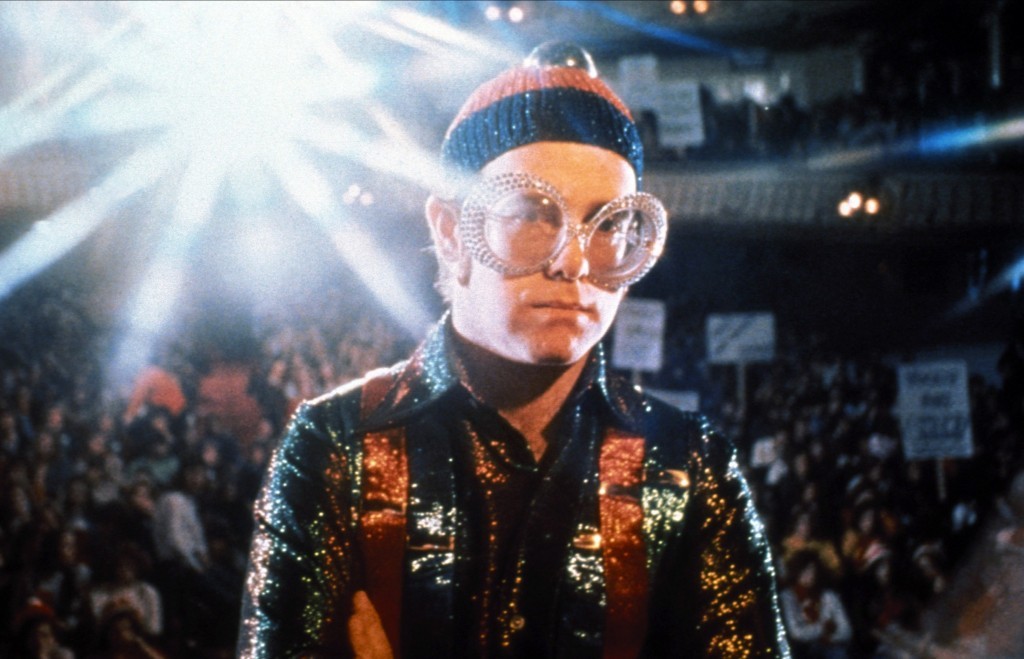
At the heart of the man known for outrageous platform boots, eccentric spectacles and feather-covered jumpsuits is a guy obsessed with classic pop.
He was so obsessed with Buddy Holly as a kid, in fact, that he took to wearing Buddy-style spectacles, even though his eyesight was fine.
Over time, wearing them damaged his eyes, and real glasses soon became a necessity — now, that is commitment to music if ever we’ve seen it.
A musician’s musician, a great pianist and distinctive singer, his fellow stars adore him as much as his millions of fans, and here we look at the stories behind 10 of Elton’s greatest songs.
YOUR SONG — 1970
THE music world was still reeling months after The Beatles split up, and John Lennon reckoned this was the first good thing to come out of Britain since.
This sensitive number is much more like Paul McCartney’s style than Lennon’s, but John loved it and would go on to work with Elton.
Having vowed to perform with him if one of Lennon’s own songs got to No 1, Elton duly obliged and they sang a version of I Saw Her Standing There together.
Of Your Song, Lennon recalled: “I remember hearing it in America and thinking: ‘Great, that’s the first new thing that’s happened since we happened.’ It was a step forward.”
ROCKET MAN — 1972
ONE of his greatest hits still gives Elton the heebie-jeebies!
This catchy tune was recorded at the Chateau d’Herouville, a French studio that has produced some classic records, but is really not a nice place to work in.
Almost every rock star who has recorded there reported strange, freezing-cold parts of the bedrooms, being aware of a presence and other spooky matters.
The great composer Frederic Chopin, and his eccentric lover George Sand — a lady who dressed as a man and smoked a pipe — are said to haunt the place.
Still, while his band sat around tucking into their full English breakfast one morning, Elton looked through co-writer Bernie Taupin’s lyrics and found this song.
He added the music and they’d recorded it within hours.
FUNERAL FOR A FRIEND/LOVE LIES BLEEDING — 1973
THERE aren’t many 11-minute epics that are played on the radio, but this is one.
Taken from Goodbye Yellow Brick Road, Elton’s best album, it’s really two pieces joined together.
Elton had written an instrumental, while thinking about the kind of music he’d like played at his own funeral, and as it finished in the key of A and Love Lies Bleeding started in A, he linked them up.
Ideal for a funeral, and even for radio.
SATURDAY NIGHT’S ALRIGHT FOR FIGHTING — 1973
ROUGH and ready, even Elton admits this massive hit is totally unlike anything else he’s recorded.
For one thing, it’s all about noisy guitars and violence, rather than pianos and love.
It was partly inspired by the old sawdust pubs in any British town, where a bit of fisticuffs broke out on a Friday night.
Or any night!
Unlike Funeral For A Friend, above, many US radio stations banned it, fearing it might encourage violence.
Elton John, bovver boy and nasty piece of work down the boozer?
Doesn’t sound very likely at all!
CANDLE IN THE WIND — 1974
THIS is much more sensitive.
It’s been a huge hit twice over, with the original shooting to No 11 and then hitting No 1 when he redid it in honour of the late Princess Diana, 14 years later.
It was, of course, written with another woman in mind, Marilyn Monroe.
Elton and Bernie Taupin, the man who writes his lyrics, have said it could also be about James Dean, Jim Morrison, or any artist cut off in their prime.
That Diana remake, by the way, sold
33 million copies, making it second only to Bing Crosby’s White Christmas, which sold 50 million.
What today’s pop stars would give to sell that many singles . . .
SOMEONE SAVED MY LIFE TONIGHT — 1975
WRITTEN years earlier, this was about Elton’s days as a struggling musician, engaged to a lady he really didn’t want to marry.
He sought advice from Long John Baldry, legendary London blues performer, who advised him to get out of the relationship and focus harder on his music.
Elton was contemplating suicide, and Baldry’s words snapped him out of it.
Although he sang it in his falsetto voice, he would be forced to change the key and sing it much lower for years, until surgery on his vocal cords.
Able at last to sing it in falsetto, he struggled not to look delighted, while singing such a sad song.
SONG FOR GUY — 1978
FOR such an upbeat, happy man, Elton can certainly write his share of heartbreaking, dark material, too.
He described writing this one on a miserable Sunday, imagining himself floating into the air and looking down at himself.
“Morbidly obsessed with these thoughts, I wrote this song about death,” he revealed.
The next day, he learned that Guy Burchett, the record company’s 17-year-old messenger boy, had been killed in a motorbike crash on the Sunday.
One of the few songs Elton wrote by himself, Guy’s mother Ann admitted that she cried any time it came on the radio.
I’M STILL STANDING — 1983
OUR hero, in fact, was so drunk, he was unable to stand at all!
The classic video for this hit was filmed in Cannes, and as Duran Duran were there at the time, they joined Elton for an impromptu party.
Delighted to see some fellow-British popsters, Elton had a few lager shandies more than he ought to, and woke up next day asking what had happened.
“You happened!” his assistant laughed at him.
Elton wasn’t the only one falling over — the video director, Russell Mulcahy, fell into the sea during the shoot, which had to be redone next day, once he was fished out.
NIKITA — 1985
HE would later admit he’d known that Nikita was a boy’s name — but the lyrics of this Elton hit were all about a female East German border guard.
In the USA, where it was a massive hit, many a young mother decided to call their daughters Nikita, while over in Moscow and elsewhere, they must have been roaring with laughter!
Nikita Khrushchev had been one of Russia’s most-famous leaders, so it was difficult not to know it was a boy’s name.
SACRIFICE — 1989-1990
YOU may be surprised to learn this was his first UK No 1 — Elton hit top spot with Kiki Dee in ’76, but never solo.
He’d created a huge stir by marrying studio engineer Renate Blauel in 1984, as many thought he preferred men, but by 1988, they were divorced.
A year on, then, this song about a marriage breaking up — and the divorce not being much of a sacrifice — is interesting enough just for the lyrics.
It didn’t quite hit the top in ’89, but as British DJs played it again, it went to the top in 1990 after being re-released.
READ MORE
Over 50 years of Tom Jones – but what are his top ten tracks?
Dame Shirley Bassey says she still feels ‘so young’ as she heads for her 80th birthday

Enjoy the convenience of having The Sunday Post delivered as a digital ePaper straight to your smartphone, tablet or computer.
Subscribe for only £5.49 a month and enjoy all the benefits of the printed paper as a digital replica.
Subscribe